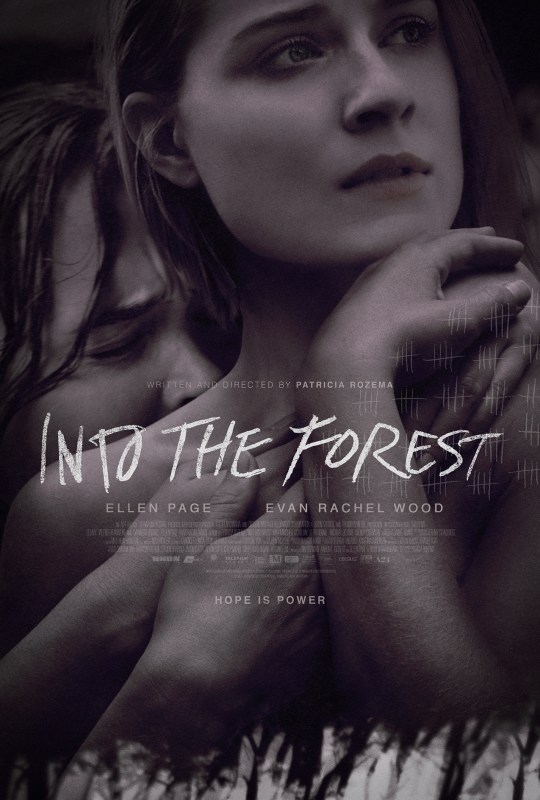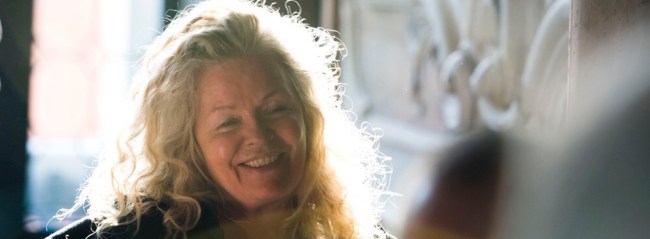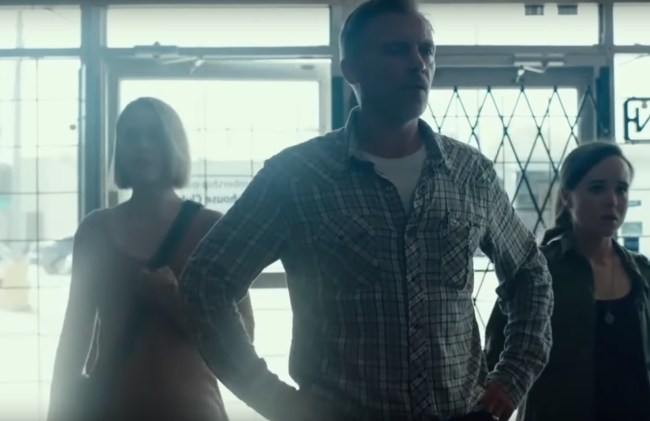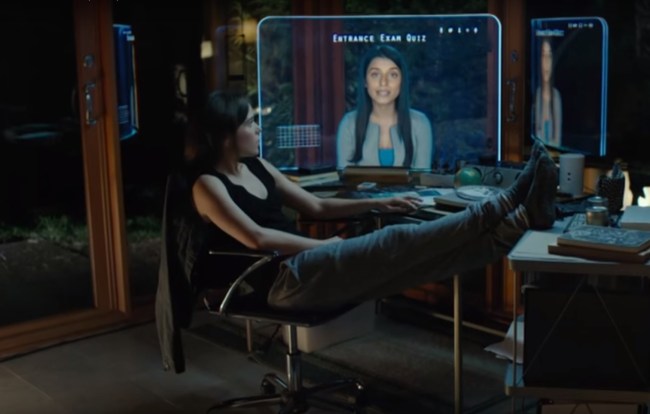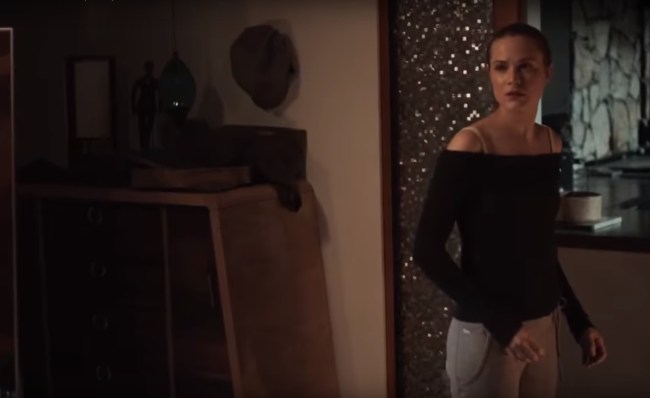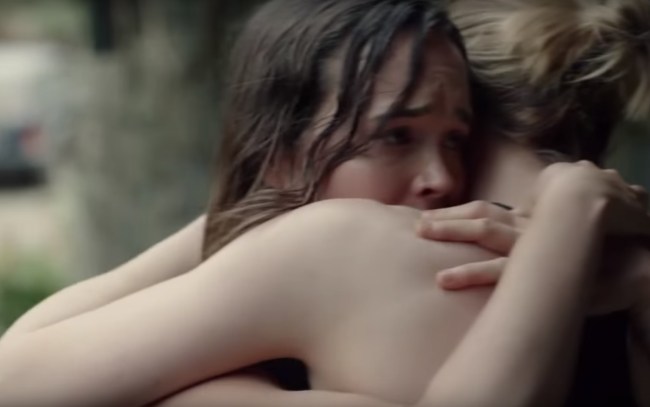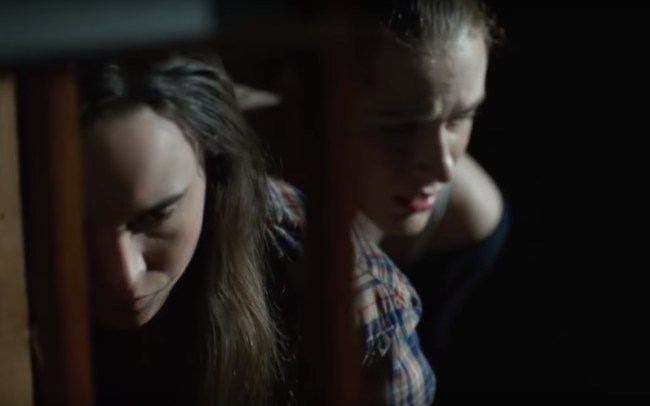Interview: Director Patricia Rozema Goes Into the Forest With Ellen Page and Evan Rachel Wood
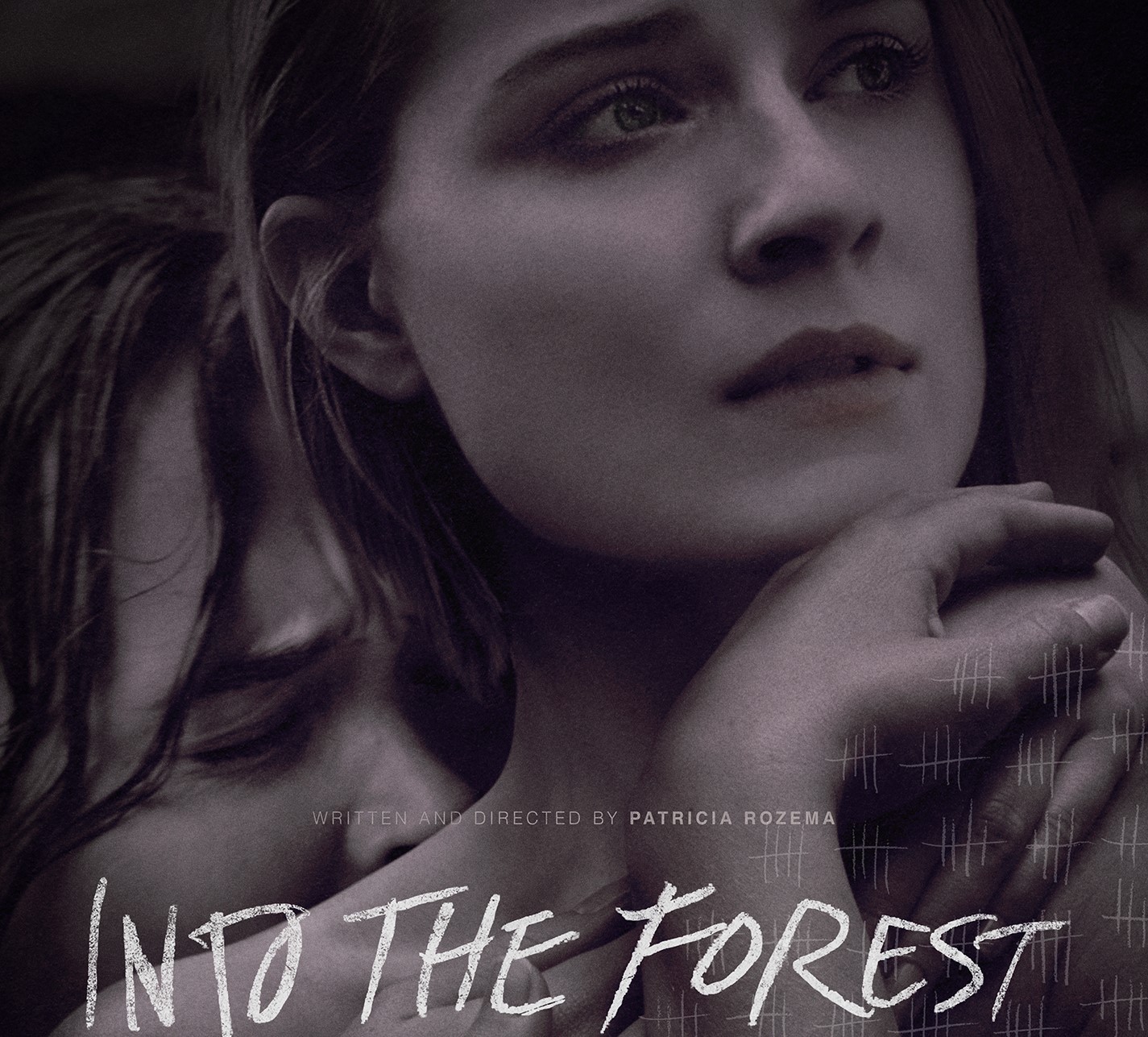
With genre blockbusters like The Hunger Games, Divergent, more recent fare like Star Wars: The Force Awakens and Ghostbusters, or the upcoming Wonder Woman, it’s clear that Hollywood is finally starting to realize that putting women in stuff will make them money. However, it isn’t just mainstream Hollywood making challenging, female-led and female-centric genre films. This week, there’s an amazing, independent, post-apocalyptic film coming out called Into the Forest, starring Evan Rachel Wood and Ellen Page.
The film, written and directed by Patricia Rozema (Mansfield Park, Grey Gardens), was adapted from a 1996 novel of the same name by Jean Hegland, and it tells the story of a family staying in their country home when suddenly, there’s an unexplained, continent-wide blackout. Here’s the official description:
Set in the near future, this riveting and suspenseful apocalyptic drama follows two sisters, Nell (Ellen Page) and Eva (Evan Rachel Wood) who live in the Pacific Northwest with their kindly father, Robert. Nell is focused on her studies and Eva is training to be a dancer, but their peaceful lives are disrupted one day by what turns out to be a continent-wide blackout. Whereas at first the family bond together and try to make the most of their difficult circumstances, as time goes on, the challenges become more serious. In the wake of a shocking and violent confrontation that Robert has with a menacing passerby, the sisters must work together in order to survive in their increasingly treacherous new world.
In an exclusive interview with TMS, director Patricia Rozema talked about what’s so fascinating about being plunged into darkness, what’s wonderful about technology, and the rare opportunity to tell a female-centric genre story with two female leads.
Teresa Jusino (TMS): Into the Forest seemed like a very feminine take on an apocalypse story, whereas if it had been more male-centric, they would’ve gone on a trek, and it would’ve been all about the violence and all about the horrible things that can happen to you. Meanwhile, this film was more an examination of what a situation like this does to you psychologically, and I really appreciated that.
Patricia Rozema: Well, don’t you think that, if this were the story of two brothers, and there they were —they had water, and a decent amount of food, and were isolated from violence and possible disease — that one might say We’ve gotta stay here, and the other one saying We’ve gotta go out. I can imagine two men still having the same dynamic.
TMS: Oh definitely. I think I could, but — and I could be totally wrong about this — I don’t know that a male writer or a male director would have made this movie.
Rozema: Maybe not a male Hollywood writer, or a male Hollywood director. I really do think that’s the distinction, because we’ve certainly seen films [that are] very similar in their lack of hysterical violence, et cetera.
But I get it. When you say “apocalypse,” there’s this expectation that there’ll be a lot more desperate running around and shooting each other until the last man’s left standing kind of a thing. And that can be fun! I have no problem with violence. In fact, there are times when I think I should do an action picture, because I’d love to do that. And it’s so easy to keep interest and tension in something like that. Drama is conflict, and when you have physical conflict, it’s just dead easy to keep people focused and interested.
TMS: Well, that’s actually one of the things I thought was amazing about Into the Forest! That even without that, it was riveting. And it was partially to do with the story, and partially to do with the spectacular performances by Evan Rachel Wood and Ellen Page. I found myself glued to the screen the entire time, despite the fact that it’s a lot of talking and reasoning things out.
Rozema: What’s fun is that people bring a certain set of expectations to the genre, and then I deliver on some of them, but not all of them. So, you just don’t know what’s going to happen. That’s exciting for me to do. I love that. But my whole thing was, and I told the crew this, this is realism. This is full-on realism. In fact, the radio reports that you hear in the film are from the 2003 blackout on the Northeast coast. And the news whenever stuff like that happens is kind of bumbling, and We don’t really know what’s happening. These journalists, and I say this as a former journalist, have this know-it-all sound, but they couldn’t maintain it.
TMS: Going back to the beginning for a second, you both wrote and directed Into the Forest, adapting it from the novel of the same name by Jean Hegland. Why this novel? What was it about this story that made you have to adapt this source material?
Rozema: My fear of it, and my fantasy of living in the forest. I think the contemporary fantasy right now is….like, every restaurant now has “foraged” this and that. There’s this light playing with the idea of We could just forage and find everything we need in the natural world around us if we just had the knowledge. But man, how hard would it be to give up our cell phones! So, I like the fantasy side of it, and I like the dread of it. It was exciting to me to play with suspense like that. Although the book had a really solvable explanation for how and why society fell apart, to me in the short time you have in a movie, it has to be more abrupt and dramatic. And I love not telling people why.
That just felt so true. Like, how would you know what’s going on after the radios stopped broadcasting? The emergency systems always say to have three days of water and batteries on hand. And after three days? What exactly happens then?
So, I was attracted to the fact that it’s of our time. I was attracted to two female leads. You don’t see that too often. And I was attracted to the affirmation of family. I find that eternal, and something that will never get tired or old or not need to be affirmed. I was attracted to finding a new way to talk about women’s vulnerability in a lawless world. We were trying to find a new way to shoot that that was respectful, and that seemed like an important challenge.
And I was attracted to almost how simple it was. It’s going into the forest. That’s what it is. It’s no more, it’s no less. It’s kind of trying to find a new relationship with nature, and I didn’t feel like it was Oh, technology is the Devil! It’s gonna turn around and bite us, which is what so much sci-fi or near-fi does. It’s all about the Frankenstein we’ve created, and I don’t have that feeling. I feel like I love technology, and I love the potential, and the hope, and the elegance of it. And yes, it might create a distance sometimes when I’m in a social situation, but it creates closeness in other ways. So, I don’t have an Oh, life was so much better when we only had books [attitude].
TMS: I’m glad you’re bringing up the technology, because I thought it was interesting — and I don’t know if this is something from the novel, or something created for the film — that [the story is set in the] near-future, and that the technology that the family had was just slightly futuristic. I was curious about why that choice was made regarding the devices they were using.
Rozema: The book was written in ’96, and it was written in the near-future then, but it never said when. They had a female President, and all the financial markets had collapsed, and they’d had so many wars that the government’s resources were depleted, so it wasn’t an alternate reality but it was speculative fiction. So, I chose to make it about four or five years from now, and then just thought OK, what would that look like? And it wouldn’t be that different. I mean, if you think about what our world looked like four or five years ago, basically our phones were different. Our TVs are different. Some of the cars, but we don’t change cars that often.
So, I thought, Focus on the technology. And then I just thought, What would be cool? And I thought the clear screen that you could see from both sides, and when it’s off it’s invisible and not taking up space in your room…it just felts sexy to me. I loved designing that stuff.
Vehicles and technology are the things that change the most quickly. But here’s a practical reason for keeping the car old: I wanted to be able to see into the back seat when they were driving, and most modern cars have tinted windows. [laughs] And I wanted to be able to do that chainsaw/shoelace thing, which I found on the Internet. That’s not in the book. [laughs] You can find it, just look up like “How to start a dead battery with a chainsaw,” I think, and you’ll find it there, and some geezer is there explaining it, and it works!
For a while, I considered making it contemporary, because all of this stuff could happen today, but I felt like it just helps suspend disbelief that much more. It elevates the possibilities a little bit more if you’re thinking Things may have happened that I don’t know about.
TMS: Something else that resonated with me in the film is the fact that Eva and her dancing, and the notion of being an artist without the things that you need to create the thing that you do. I thought that was powerful. [Note: in the film, Wood’s dancer character has a metronome that she tries to dance to in the absence of any playable music] As a writer myself, I thought What if I didn’t have paper, or pencils or pens, how would I survive something like that not being able to write?
Rozema: We’d go back to birch bark, you know? Really! Or you’d get pieces of stone and write on the concrete. Wouldn’t you? You’d have to. Probably, we’d all revert to storytelling around a fire and like it even more.
What I love in the book, and in this story, is the notion that their riches, which in this case is gas [for their car, for their generator]….at first, it’s a complete waste to think of using their gold on things like music and watching home movies and dance. Then by three-quarters of the way into the movie, you’re thinking, They need that nourishment. They need that moment of joy.
We realize that we need art. And I’m not just promoting my own self-interest by saying that, but I really believe that we need stories and we need music almost more than anything. When people have leisure time to do anything they want, they read, they watch movies…they get stories, and they listen to music. And they go to large bodies of water. So it’s a nice, inadvertent gesture to remind us how much we need all those soft things in our lives. It’s not always clear in government policy that these things matter.
TMS: Lastly, I thought that your two lead actresses were wonderful, and that you got such beautiful performances out of them. I would love to hear about what the casting process was like, and what ultimately made you decide on these two?
Rozema: Well, Ellen came to me with the book [Note: Page is a producer on the film], so she was always Nell. And we talked together, and Evan was her idea, and I loved that idea, so she contacted her directly. She knew her a tiny little bit as an acquaintance, but Ellen got the script to her. And Evan took maybe two hours to respond and say I have to do this. So, it was one of those instant, beautiful things.
And it’s nice as a director and a writer to be dealing directly with the creative team. It made me think, That’s the way to go! The actors that have screenplays, or novels. Because they’re not going to disappear if there’s a delay, or you can’t get your financing immediately. So, it was beautiful from the production side. It was very immediate and artistic, and I wasn’t fighting stupid battles with people who don’t see it the same way. We were just there on set making it up as we get along. I mean, the screenplay was a blueprint, and I always do storyboards, but still. All the fine-tuning was just between us, and that was a real great pleasure.
And those two, they come so prepared. They did their homework. They’d have to do a scene where they had to break down, and they just came to set brimming. I just had to let them go, and I wouldn’t muck with them during their first stab at a scene. Later on, I might gently nudge them in one direction or another, or get an alternative…but I can’t put depth in people’s eyes. I can’t give them a great sense of humor. I can’t make them as beautiful as they are. They just bring so much.
I don’t want to minimize my role as a director, because I know what I bring to the table, and I make it coherent and control tone and create an atmosphere of, I hope, honesty and I hope that permeates the whole thing. But those two brought their best game, and I think they’re the top of their generation right now. They’re both a voice for young women of intelligence and daring, and they’re searingly honest. How lucky am I to get to play with that?
Into the Forest hits theaters and VOD on Friday, July 29th!
Want more stories like this? Become a subscriber and support the site!
—The Mary Sue has a strict comment policy that forbids, but is not limited to, personal insults toward anyone, hate speech, and trolling.—
Follow The Mary Sue on Twitter, Facebook, Tumblr, Pinterest, & Google+.
Have a tip we should know? [email protected]
